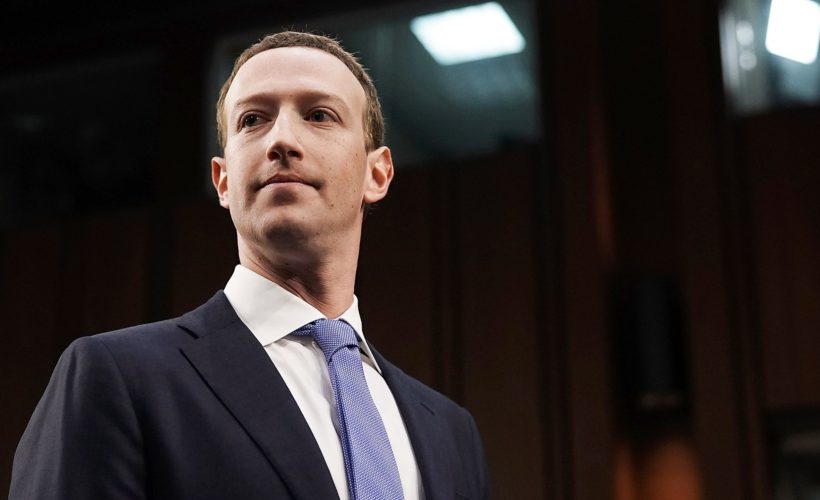You’d never know that Facebook has been in the center of a global maelstrom by looking at its financial results or listening to its executives. On Wednesday, Facebook reported quarterly revenue of $11.97 billion, earnings per share of $1.69, 2.2 billion monthly active users, and 1.45 billion daily active users, both up 13 percent from the same quarter last year.
The financial statement covers January through March, and therefore doesn’t fully reflect any fallout from reports beginning in mid-March that Cambridge Analytica obtained data on as many as 87 million unwitting Facebook users. That led to the #deletefacebook movement, a federal investigation and two hearings at which Facebook CEO Mark Zuckerberg was hauled before Congress.
Facebook has responded by curbing outsiders’ access to its data, vowing to hire thousands of additional content reviewers, and offering users clearer privacy controls. On top of changes to the news feed announced in January, those moves could dampen Facebook’s growth in revenue or profits. But no such impact was apparent Wednesday.
“I don’t think they do anything that will cost them more than a dollar over the long term,” said New York University professor Scott Galloway. The changes Facebook announced to regain consumer trust were “a series of half measures — one part delay, one part obfuscation. They’ve effectively done nothing [and] it doesn’t look like anyone cares,” he said. Consumers outraged by recent revelations tend to express that outrage on Twitter and Facebook, he said.
A few clouds were visible on the distant horizon, most notably a European privacy law that takes effect May 25, imposing stricter rules around collecting and handling personal data.
Facebook’s chief financial officer David Wehner said the company expects its count of users in the EU to be “flat to slightly down sequentially,” as a result of new ways the company has to ask for consent to track users. He also acknowledged the possibility that restrictions on data collection could lead to less successful ad targeting. But when prodded about a potential “doomsday scenario,” of declining users leading to fewer advertisers, Wehner shrugged it off.
Facebook also declined to discuss how much time users are spending on the site. Three months ago, Zuckerberg said time spent on Facebook fell roughly 5 percent in the fourth quarter of 2017, equivalent to 50 million hours a day. Data from Nielsen seems to show that Facebook’s share of time spent on digital media is falling.
But on Wednesday, Zuckerberg would only say that users are sharing and interacting more, although he acknowledged that passive video consumption is falling. He contrasted that with the company’s video vertical called Watch, where users intentionally go to watch specific content or watch with friends, implying there would be a more engaged audience for advertisers.
The strong numbers were accompanied by equally bullish commentary by Facebook executives. Chief operating officer Sheryl Sandberg said a handful of advertisers paused spending in the wake of Cambridge Analytica scandal, but one has already returned to Facebook’s fold.
Sandberg also said executives don’t expect any impact from new privacy constraints anywhere outside Europe. Facebook has said users all over the world will be getting the same privacy “controls” the company is offering in Europe, though not necessarily the same protections.
Sandberg said that controls won’t be in the same format outside Europe and will be “localized for different parts of the world,” which is why the user response will be different. Facebook did not address its recent change to the terms of service to users outside Europe and North America, which could inhibit those users’ rights under the European rules, known as GDPR.
Sandberg sounded much more convincing when she pointed out, repeatedly, that GDPR will hit the entire ad industry, where Facebook still offers a great return on investment.
The surge in profits run counter to a warning Zuckerberg issued in November, when he said Facebook’s profitability would take a “significant” hit because the company was spending so much money fighting threats like election interference, fake news, and harmful content. “I’m dead serious about this,” he told investors.
Facebook has been able to keep its growth curve moving up and the to the right because recent privacy and data policies, while highly publicized, seemed to steered clear of the company’s ability to make money. For instance, in January, Facebook altered its news feed algorithm to favor content from family and friends in order to make time spent on Facebook more meaningful. That hurts publishers, but could potentially benefit advertisers if users pay closer attention to content, said Martín Utreras, vice president of forecasting at eMarketer.
Advertisers, Facebook’s paying customers, can’t afford to ignore the power of a platform that lets them micro-target groups as narrow as “teenagers who just got their driver’s licenses,” Galloway said. (Although in that particular scenario, Facebook could run into some trouble. A recent eMarketer report found that the trend of younger users flocking to rivals like Snapchat continues. “I wouldn’t say abandoning Facebook, but probably using less it less,” says Utreras.)
Zuckerberg debuted what seems likely to be a new talking point for the company. Facebook is investing heavily in improving safety, “but at the same time we also have a responsibility to keep moving forward,” to build tools to connect people, he said, mentioning three times that he was “proud” of Facebook’s work.
Nearly 99 percent of Facebook in the first quarter came from advertising and ad revenue increased 50 percent from the same quarter in 2017. Sandberg said Facebook has explored other ways to make money, but is sticking with ads, where “We have a lot of runway ahead of us,” she said, pointing out that Facebook’s 6 million advertisers could be converted to Instagram, which has two million advertisers, and that’s even before moving on to Messenger. A “click to Messenger” is something that Facebook could do across services that have a more than a billion plus users, but have yet to be monetized, she said.
Sandberg did not address how sharing that data across services might run into problems with GDPR. Instead she pointed out that ads give Facebook an ability to offer free services. But Facebook may have some wiggle room there. The company’s operating margin for the first quarter was 46 percent, up 5 percentage points year-over-year.
Face Forward
- What Facebook doesn’t show you when you “Download Your Data.”
- Facebook’s targeted ads are more complex than it lets on.
- Facebook employees watching CEO Mark Zuckerberg testify to Congress breathed a sigh of relief.
Source:WIRED











